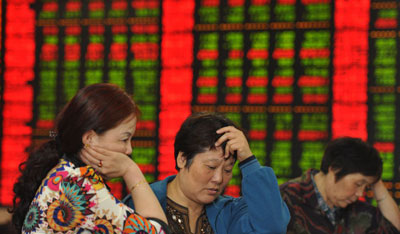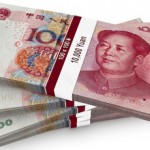China stocks firm on property shares; Hong Kong hit by global weakness

China stocks edged higher on Wednesday as property shares rallied for a second day and on growing expectations of state-owned enterprise (SOE) reforms.
But trading volume in Shanghai, which shrank to a two-month low on Tuesday, remained thin amid signs that investors are turning their focus to gold and bonds.
China’s blue-chip CSI300 index .CSI300 rose 0.2 percent to 3,195.81 points by the lunch break, while the Shanghai Composite Index .SSEC gained 0.3 percent to 2,979.44.
In Hong Kong, main indexes dropped over 1 percent, tracking losses in global equity markets.
Lingering concerns over China’s economy continued to haunt investors. A private survey showed on Wednesday that growth in the services sector cooled in July, with weaker expansions in activity prompting companies to shed staff for first time in four months.
Although regulators are hoping to guide capital into the real economy with tighter rules, analysts say liquidity is actually flowing into perceived safe haven assets such as bonds and gold.
“The economy is in such a bad shape. How can you expect wise money to invest in the real economy?” said Chang Chengwei, analyst at brokerage Hengtai Futures.
China’s outstanding margin loans dropped for five straight sessions to a one-month low.
In contrast, Huaan Gold ETF (518880.SS), China’s biggest gold exchange-traded fund, jumped 35 percent in size over the past month. Overseas investment products are also in hot demand.
Sentiment on Wednesday was underpinned by further strength in property shares .CSI300REI, which rose 1 percent after reports earlier this week showed home prices are still rising rapidly in most larger Chinese cities.
Investors also bet on SOE reforms, pushing the Shanghai SOEs Index .CSI950096 over 1 percent to a record high.
The government has long pledged changes to the often bloated, inefficient state sector, but it has increasingly relied on such firms in recent months to drive economic growth in the face of faltering private investment, spurring doubts about its commitment to reforms.
In Hong Kong, the Hang Seng index .HSI dropped 1.7 percent to 21,752.01, while the Hong Kong China Enterprises Index .HSCE lost 1.4 percent to 8,997.54.
HSBC (0005.HK) fell 1.7 percent after reporting core first-half profit fell 29 percent, below estimates, as revenue at Europe’s biggest bank was hit by slowing economic growth in its key markets of Britain and Hong Kong.
Source: Reuters



























